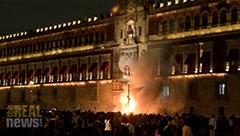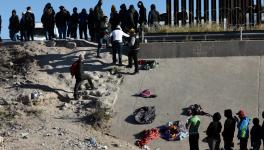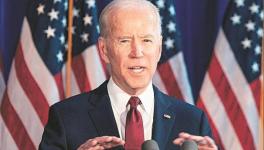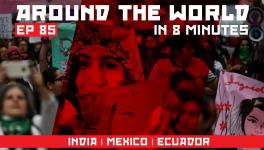Tens of Thousands March to End Impunity for the Mexican Narco-State
Prof. John Ackerman argues that outrage over the 43 recently disappeared college students has the potential to unite social forces to challenge the US-backed Mexican Narco-state

Transcript:
Tens of Thousands March to End Impunity for the Mexican Narco-StateJAISAL NOOR, TRNN PRODUCER: Welcome to The Real News Network. I'm Jaisal Noor in Baltimore.
What are being described as historic protests are gripping Mexico over the disappearance of 43 college students. Government officials are now saying three suspects from a narco gang confessed to the killings and disposing of the students' bodies. Thousands have taken part in the protests that have raged across the country in recent days, and including the burning of the door of the ceremonial presidential Palace in Mexico City. The students belong to a radical teachers college, and on September 26, traveled to Iguala in the southern Mexican state of Guerrero to commandeer buses for a later protest, when police allegedly opened fire on them, killing six. Then the 43 were handed over to a notorious local drug gang with connections to the town's mayor, who along with his wife are among the dozens who have been arrested in connection to the disappearances.
Now joining us to discuss this from Paris, France, is John M. Ackerman. He's a professor at the National Autonomous University of Mexico and editor-in-chief of the Mexican Law Review.
Thank you so much for joining us again, John.
JOHN ACKERMAN, LAW PROFESSOR, UNAM: Jaisal, a pleasure as always to be with The Real News.
NOOR: So, John, why have the recent statements by authorities that they have a confession and may have found the remains of the students not calmed the protest and the families of the missing students?
ACKERMAN: Well, they have actually made things worst worse, because this press conference [incompr.] by the attorney general last Friday was just full of contradictions. It didn't present any definitive information or conclusions of the investigation. We've now been six weeks, almost, since this massacre in Iguala, Guerrero, which took place on September 26, and the authorities are still struggling in their own labyrinth of complicity and impunity. That's the only way I can put it.
They are trying to--their political strategy is very clear: they're trying to focus all the attention on the local government, on the municipal president, on the narcos, as if this was just a case of some corrupt local mayor in cahoots with some bad guys in the narcos. But actually what this is reflecting, the situation, is a national crisis. In fact, I think this is an international crisis.
And it's really been unfortunate that the U.S. government, Obama, the U.S. Congress, has not paid more attention to this. We understand they're busy with other sorts of adventures abroad, but this is right at home in Mexico. And Mexico is really up in arms. And there's a vast social mobilization which has rosen up with the Mexican people, demanding not just justice for this massacre, but democracy, authentic democracy, political change in Mexico, because Mexico doesn't feel a whole lot like a democracy these days, not only because of this massacre, but because of the last two years of consistent repression of social movements, censorship of the media, the approval of political and economic reforms which go directly against the basic foundations of the modern Mexican state. You guys, The Real News, have given some great coverage to this over the last couple of years. And this is really kind of the straw that broke the camels back.
NOOR: Now, John, we want to unpack all these points, these great points you're making. So official crime numbers are down under the current administration of Peña Nieto.
ACKERMAN: No.
NOOR: So that's kind of what he's arguing. But some of the points you've raised, including the fact that several mass graves were found in the search for these students, this underscores the power of the narco gangs and their relationship with the political elite. Can you talk a little bit about what's been happening across Mexico and why people are starting to challenge the claims of the Peña Nieto administration.
ACKERMAN: Yeah, well, actually, the crime statistics are highly debated. In general, crime is not down. The national statistics bureau recently issued their report for 2003 [2013], which is the first year of Enrique Peña Nieto's administration. The number of homicides has come down slightly, which means from a high number of 22 to 20,000 in a year. This doesn't mean that things are actually changing for the better, especially when you take into account that kidnappings have gone up and in general crime is worse. The economy's doing pretty bad as well.
And the political class has lost its dynamism that it had before. We no longer have this sort of plural Congress. Everything's decided in the executive by the president, as it was in the past. So things are not moving forward in Mexico. To the contrary.
And precisely, yes, this crisis has created a very complicated situation, because once the authorities started to investigate, they started to find not one, but two, but three, over a dozen mass grave sites, most of them filled with bones or other remnants, human remains, in the area around Iguala. Apparently, this area of Iguala is a totally narco-controlled area, and supposedly nobody knew about this, even though there are army bases stationed there, there are federal police presence there constantly in Guerrero.
Two years ago, I remember, I was in an interview with you guys, with Paul, Paul Jay in The Real News, and it was just a couple of weeks after in Iguala itself two activists had been assassinated by orders of this mayor. That crime was never cleared up, never investigated, so much so that this mayor once again today comes to the top of the headlines.
But once again, this is not just about a mayor or not just about the narcos. These are federal crimes--organized crime, narco trafficking--and the responsibility for investigating and prosecuting them rests solidly and directly on the federal government. So it's a mistake to think that somehow Peña Nieto's going to resolve all this. And the people on the ground in Mexico are very clear on this. Their protests are not just against the mayor of Iguala or not just against the narcos; they are against the narco state, the narco government which rules Mexico from the top to the bottom.
NOOR: And you argue that this current crisis, as it's unfolded, it's united three different social movements that never quite achieved their goals in the last several years. And their combining forces and combining power may provide an opportunity to do that, to transform Mexican society and really challenge the powers that have so tightly gripped control there.
ACKERMAN: We'll see. You know, this could fizzle out just like so many other springs and falls throughout the world, from Brazil to Egypt to Occupy Wall Street. This could just be another flash in the pan. But it seems like it has more legs than that, precisely because, as you mentioned, Jaisal, this brings together various different currents of discontent. It's not just one, and it's not just about social networks, although social networks, of course, have played a role.
So we've been having protests for many years against the drug war, and most notably in 2011, led by poet Javier Sicilia and Movimiento por la Paz, the Movement for Peace. He even came to the United States and did a caravan in the United States. That was a very important movement, 2011.
Then, in 2012, there was a very active student movement, the Yo Soy 132 student movement, which was against Peña Nieto directly during the electoral campaign, presidential campaign, in 2012.
And then after that, in 2013, we had a very important outbreak of protest in the area of education reform. Peña Nieto passed reform which looks to basically impose the sort of privatized, standardized testing framework which is used in the United States to the Mexican educational system, which historically has had much more of a humanist and critical approach. And so this led to--and also fire teachers, which is the most delicate reason for the protest. Teachers have lots of experience. And, for instance, the kids who were shot down and disappeared on September 26 are from a teachers college. This is a teachers college, which, with Enrique Peña Nieto's neoliberal education reforms, would be eventually disappeared, and which these kids would no longer have jobs available to them after they graduate.
And so we have protests against neoliberalism, we have protests against the drug war, and we have protests against authoritarianism, Peña Nieto. All three of these are coming together, and that's what's really creating this explosion throughout the country and all over the world. We've had over 80 cities, some say even 100 cities throughout the world with solidarity protests, solidarity protests with the Mexican students. And that's why this has gotten so big so quickly.
NOOR: And finally, John, what can the American public do? Because all the policies you just mentioned, there's a strong case that can be made that those are being driven from the United States, from the U.S. government and on other institutions here. So what do Mexicans want Americans to do about this?
ACKERMAN: Well, I can't for the next be a spokesman for the Mexican people.
I am a citizen of both countries, and it seems to me that both the United States and Mexico are together in this history and this story and this reality. And, of course, Latinos, for instance, in the United States would greatly benefit by having a democratic Mexico, a Mexico who had a government who was actually accountable to its people and a represented the interests of the people. That could have a big influence in Washington and in the United States for, for instance, immigration reform, not like Peña Nieto today, who basically is a lackey to Obama and his plans. So that would be in the interest of Latinos in the United States.
And also, Mexicans in Mexico very much need the support of Latinos and, in general, U.S. civil society to support their struggles in Mexico for justice, for human rights. And this is an interests of, I think, both sides of the border. And it very much it is important, the international solidarity is important from the United States to the people in Mexico, because, for instance, today the Mexican military, they've started to make some very dangerous commentary, public declarations which imply that they might even be willing to get closer to political power, a coup or something like that. They don't say it directly, but it's very scary. And they would only be daring to do that, to say those kinds of things if they felt--and they do feel--that they have the undying blind support of the Obama administration in his military and his drug war.
Now, to counteract that in Mexico, we're going to need a lot of support from the people from civil society in the United States to prevent Mexico continuing to be a killing field and just a place where the United States goes to get oil and doesn't care about the people.
NOOR: Well, we're going to certainly keep following this story. John Ackerman, thank you so much for joining us.
ACKERMAN: Thank you very much, Jaisal. An honor.
NOOR: And thank you for joining us on The Real News Network.
Get the latest reports & analysis with people's perspective on Protests, movements & deep analytical videos, discussions of the current affairs in your Telegram app. Subscribe to NewsClick's Telegram channel & get Real-Time updates on stories, as they get published on our website.
























